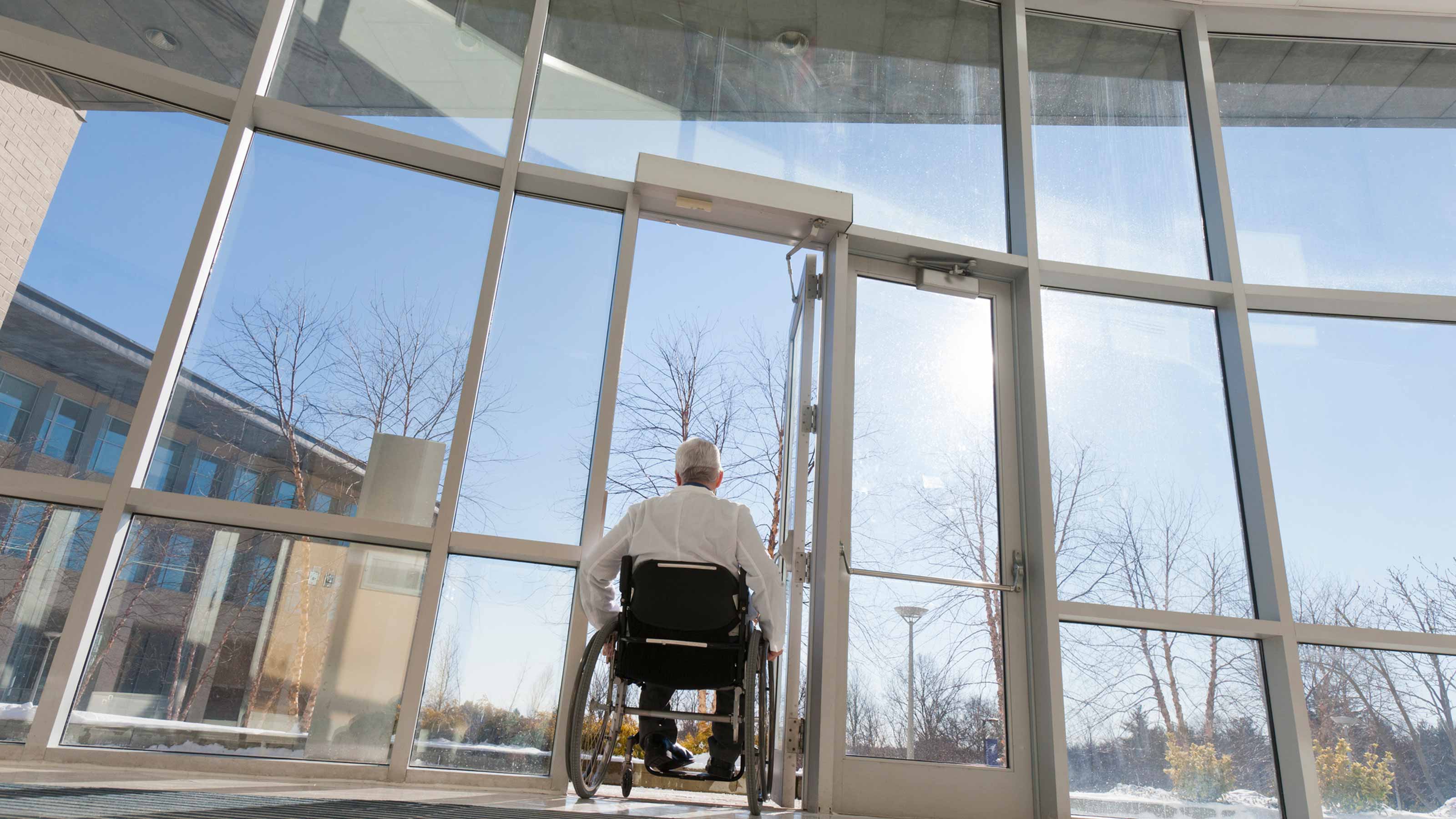Applying for Disability Benefits While the SSA Offices Remain Closed
Getting Social Security Disability benefits isn’t easy, and with Social Security Administration offices closed, it can be even tougher. Here are some tips to improve your chances.


Profit and prosper with the best of Kiplinger's advice on investing, taxes, retirement, personal finance and much more. Delivered daily. Enter your email in the box and click Sign Me Up.
You are now subscribed
Your newsletter sign-up was successful
Want to add more newsletters?

Delivered daily
Kiplinger Today
Profit and prosper with the best of Kiplinger's advice on investing, taxes, retirement, personal finance and much more delivered daily. Smart money moves start here.

Sent five days a week
Kiplinger A Step Ahead
Get practical help to make better financial decisions in your everyday life, from spending to savings on top deals.

Delivered daily
Kiplinger Closing Bell
Get today's biggest financial and investing headlines delivered to your inbox every day the U.S. stock market is open.

Sent twice a week
Kiplinger Adviser Intel
Financial pros across the country share best practices and fresh tactics to preserve and grow your wealth.

Delivered weekly
Kiplinger Tax Tips
Trim your federal and state tax bills with practical tax-planning and tax-cutting strategies.

Sent twice a week
Kiplinger Retirement Tips
Your twice-a-week guide to planning and enjoying a financially secure and richly rewarding retirement

Sent bimonthly.
Kiplinger Adviser Angle
Insights for advisers, wealth managers and other financial professionals.

Sent twice a week
Kiplinger Investing Weekly
Your twice-a-week roundup of promising stocks, funds, companies and industries you should consider, ones you should avoid, and why.

Sent weekly for six weeks
Kiplinger Invest for Retirement
Your step-by-step six-part series on how to invest for retirement, from devising a successful strategy to exactly which investments to choose.
When the COVID-19 pandemic began in earnest in spring 2020, the Social Security Administration (SSA), along with scores of businesses, was forced to close about 1,200 field offices and transition thousands of employees to remote work status practically overnight. For well over a year, it was unclear when or how the offices would reopen as the world waited and watched the trajectory of the virus.
The SSA offices have remained mostly closed to the public, though they offer limited in-person services for people with “dire” needs. This has caused difficulty for the millions of Americans with disabilities who rely on the responsiveness of the SSA and its employees to apply for and receive their Social Security Disability (SSDI) benefits following a work-disrupting disability. Recent negotiations have led to a revised, but still tentative reopening date of March 30, 2022, over two full years since the field offices initially closed.
If you are one of the millions of people waiting for updates on your application or approval status, here are some tips to maximize your chances of success.
From just $107.88 $24.99 for Kiplinger Personal Finance
Become a smarter, better informed investor. Subscribe from just $107.88 $24.99, plus get up to 4 Special Issues

Sign up for Kiplinger’s Free Newsletters
Profit and prosper with the best of expert advice on investing, taxes, retirement, personal finance and more - straight to your e-mail.
Profit and prosper with the best of expert advice - straight to your e-mail.
Apply for SSDI Immediately.
There is no time to lose when it comes to applying for SSDI. Due to the field offices being closed, the administration is seeing a significant backlog. The initial application can take three to six months to review, and typically only about one in three applications are approved.
Waiting until the SSA field offices reopen to apply will only hurt your financial situation, and possibly your savings and retirement fund, especially if you have no other regular income.
If you are thinking about applying for SSDI, check the categories of eligible disabilities online to see if you are eligible to receive the benefits you deserve and earned while working.
Use a representative to get help early.
Applying for SSDI is a multistage process that can be incredibly complex and can prove to be both physically and mentally exhausting. Many applications fail to get approved simply because the applicant did not submit all the required documentation. Having an experienced, dedicated representative advocating for you can make a huge difference in getting your application and claims approved in a timely manner.
This is especially true since SSA’s operational process has grown more complicated on a state-by-state level, with different state Disability Determination Services (DDS) offices taking different approaches to managing workloads. An effective representative should be familiar with the policies and procedures of the SSA, can advocate for you and your particular disability, and can help ensure that all necessary forms and documents are in order, properly completed and submitted electronically to the federal agency.
Create a budget and adjust your spending habits accordingly.
As described above, it is likely going to take some time for the SSA’s offices and staff to get back up to speed once they reopen. This may mean needing to go for longer than expected without receiving a benefits payment. Looking at your finances and creating a budget could help you live beneath your means and remain financially secure for an interim period while the SSA processes your paperwork.
If you still find yourself coming up short financially, consider searching for community and social or faith-based organizations that may be willing to provide temporary assistance, helping out by providing food or funds for housing, utilities and other expenses.
Keep your health insurance.
With expected delays, it might be tempting to opt out of health insurance. However, having medical evidence is critical to support your claims. The lack of medical records could be a reason why your application gets denied. Therefore, you should consider your health insurance options, such as COBRA, Health Insurance Marketplace plans or Medicaid.
If you need to stop paying for health insurance premiums due to cost or other circumstances, then look for low-cost or free health care clinics serving your area. You can find a list at the federal website: FindAHealthCenter.hrsa.gov.
Profit and prosper with the best of Kiplinger's advice on investing, taxes, retirement, personal finance and much more. Delivered daily. Enter your email in the box and click Sign Me Up.

Steve Perrigo, J.D., is Vice President, Sales and Account Management, for Allsup and has over two decades of experience and knowledge of the Social Security Administration (SSA) and its programs. He joined Allsup in August 2010 and helps clients understand their options when coordinating private disability insurance benefits with the Social Security program. Prior to joining Allsup, Steve Perrigo spent 17 years with the SSA in various roles of increasing responsibility.
-
 Over 65? Here's What the New $6K 'Senior Deduction' Means for Medicare IRMAA Costs
Over 65? Here's What the New $6K 'Senior Deduction' Means for Medicare IRMAA CostsTax Breaks A new deduction for people over age 65 has some thinking about Medicare premiums and MAGI strategy.
-
 U.S. Congress to End Emergency Tax Bill Over $6,000 Senior Deduction and Tip, Overtime Tax Breaks in D.C.
U.S. Congress to End Emergency Tax Bill Over $6,000 Senior Deduction and Tip, Overtime Tax Breaks in D.C.Tax Law Here's how taxpayers can amend their already-filed income tax returns amid a potentially looming legal battle on Capitol Hill.
-
 5 Investing Rules You Can Steal From Millennials
5 Investing Rules You Can Steal From MillennialsMillennials are reshaping the investing landscape. See how the tech-savvy generation is approaching capital markets – and the strategies you can take from them.
-
 When Estate Plans Don't Include Tax Plans, All Bets Are Off: 2 Financial Advisers Explain Why
When Estate Plans Don't Include Tax Plans, All Bets Are Off: 2 Financial Advisers Explain WhyEstate plans aren't as effective as they can be if tax plans are considered separately. Here's what you stand to gain when the two strategies are aligned.
-
 Counting on Real Estate to Fund Your Retirement? Avoid These 3 Costly Mistakes
Counting on Real Estate to Fund Your Retirement? Avoid These 3 Costly MistakesThe keys to successful real estate planning for retirees: Stop thinking of property income as a reliable paycheck, start planning for tax consequences and structure your assets early to maintain flexibility.
-
 I'm a Financial Planner: These Small Money Habits Stick (and Now Is the Perfect Time to Adopt Them)
I'm a Financial Planner: These Small Money Habits Stick (and Now Is the Perfect Time to Adopt Them)February gets a bad rap for being the month when resolutions fade — in fact, it's the perfect time to reset and focus on small changes that actually pay off.
-
 Social Security Break-Even Math Is Helpful, But Don't Let It Dictate When You'll File
Social Security Break-Even Math Is Helpful, But Don't Let It Dictate When You'll FileYour Social Security break-even age tells you how long you'd need to live for delaying to pay off, but shouldn't be the sole basis for deciding when to claim.
-
 I'm an Opportunity Zone Pro: This Is How to Deliver Roth-Like Tax-Free Growth (Without Contribution Limits)
I'm an Opportunity Zone Pro: This Is How to Deliver Roth-Like Tax-Free Growth (Without Contribution Limits)Investors who combine Roth IRAs, the gold standard of tax-free savings, with qualified opportunity funds could enjoy decades of tax-free growth.
-
 One of the Most Powerful Wealth-Building Moves a Woman Can Make: A Midcareer Pivot
One of the Most Powerful Wealth-Building Moves a Woman Can Make: A Midcareer PivotIf it feels like you can't sustain what you're doing for the next 20 years, it's time for an honest look at what's draining you and what energizes you.
-
 I'm a Wealth Adviser Obsessed With Mahjong: Here Are 8 Ways It Can Teach Us How to Manage Our Money
I'm a Wealth Adviser Obsessed With Mahjong: Here Are 8 Ways It Can Teach Us How to Manage Our MoneyThis increasingly popular Chinese game can teach us not only how to help manage our money but also how important it is to connect with other people.
-
 Looking for a Financial Book That Won't Put Your Young Adult to Sleep? This One Makes 'Cents'
Looking for a Financial Book That Won't Put Your Young Adult to Sleep? This One Makes 'Cents'"Wealth Your Way" by Cosmo DeStefano offers a highly accessible guide for young adults and their parents on building wealth through simple, consistent habits.